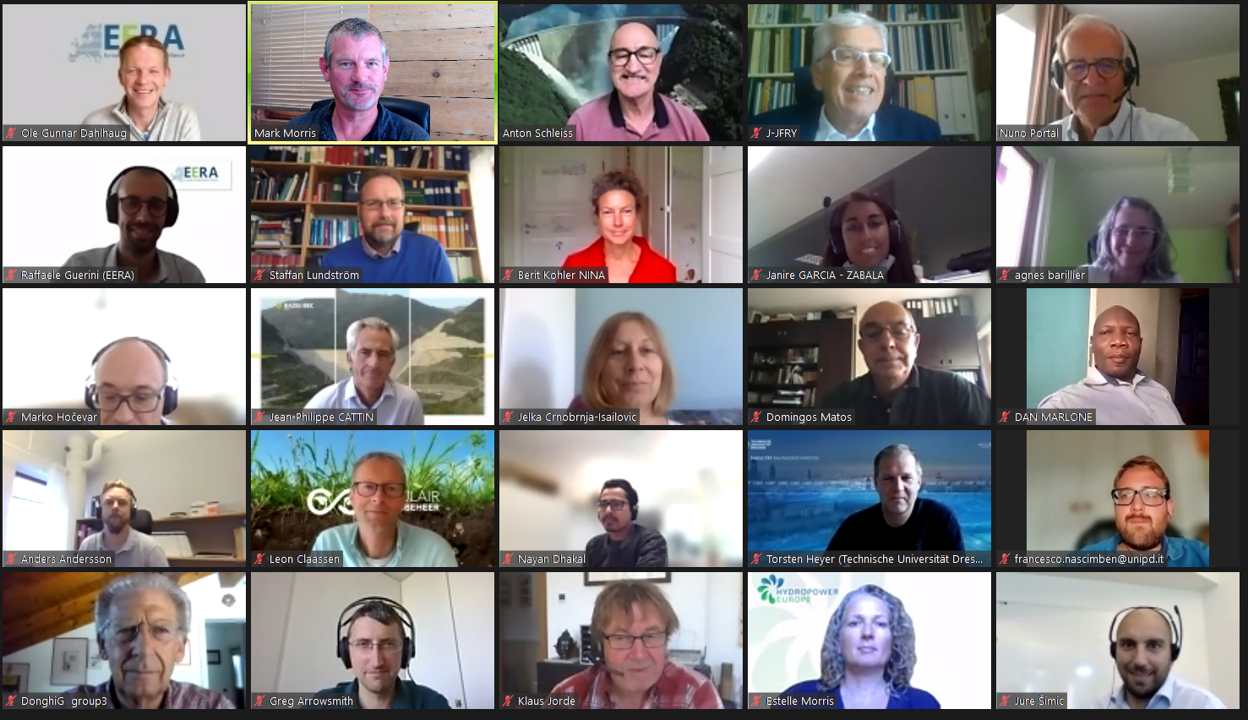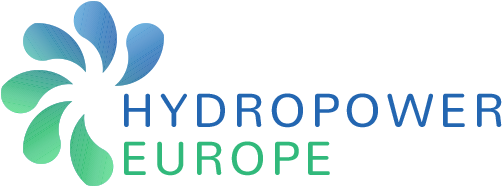Press Releases
Joint event EERA JP HYDRO and HYDROPOWER “Sustainability and the acceptability of hydropower as part of the clean energy transition”
*Recording of the webinar below*
On the 2nd of September, over 60 participants attended the webinar: “Sustainability and the acceptability of hydropower as part of the clean energy transition” hosted jointly with EERA JP HYDRO and HYDROPOWER EUROPE.
The event, organised on the framework of the European Sustainable Energy Week 2021 (EUSEW21), counted on four experts who shed some light on the socioeconomic and ecological consequences of hydropower, and how they can be mitigated to achieve the full potential that hydropower can reach to in the clean energy transition.
Anton Schleiss, honorary president of ICOLD and professor emeritus at EPFL, opened the session and introduced the main topic of the event. Ole Gunnar Dalhaugh, acting Coordinator of EERA’s Joint Programme Hydropower, acted as chair of the session.

Main findings:
-
- Berit Köhler, Norwegian Institute for Nature Research, Norway
Ms Köhler started by detailing the environmental and socioeconomic consequences of hydropower at different levels, where the perception at local community level is usually the one which creates the most problems to successfully implement hydropower projects. For this reason, she stressed the importance on the research of social acceptance to avoid unnecesary conflicts, promote social sustainability and the clean energy transition of the region.
-
- Agnès Barillier, EDF, France
Ms Barillier presented us with some successful examples where the environmental impact of hydropower had been mitigated. She concluded that it was imperative to work with stakeholders and have a long-term commitment in order to reduce it.
-
- Staffan Lundström, Luleå University of Technology, Sweden
Mr Lundström expressed that, without mitigation technology, there is a risk that the increasing regulation affects the environment and the society in a negative way. In this sense, flexible hydropower can have a key role in environmental mitigation.
-
- Nuno Portal, EDP Produção, Portugal
Mr Portal made an overview of EDP Produção 's history and the challenges he has faced during the years that he has worked there. He expressed his concern about the 2050 challenges. To name one: it is foreseen that the demand of electricity will triple, and this will need to be achieved with zero-carbon emission technologies.
Poll on provocative statements
At the end of the presentations, the participants responded to nine questions that had been prepared by the speakers in the form of polls (1 do not agree - 10 strongly agree):
- The social acceptance of hydropower could be a critical bottleneck in the clean energy transition. - 43% marked 8
- The local environmental impacts of hydropower production have not been taken seriously enough - 24% marked 10 (strongly agree)
- It is necessary to find optimised solutions for both, hydropower production, the local environment and the people living in the area - 86% marked 10 (strongly agree)
- A developer should abandon a project if mitigation of ecological issues has no local acceptance - shared majority of 21% between 10 and 8
- An operator must be commited to continuous improvements in the preservation of the local environment - 55% marked 10 (strongly agree)
- Highly flexible hydropower is beneficial for the ecosystem in a regulated river - shared majority (34%) between 8 and 5, this one meaning unsure.
- Effects from a highly flexible hydropower can be mitigated - 33% maked 8, followed by 23% of 10, and a noticeable 17% of unsure (5)
- Hydropower projects still have an important role in the switch to renewable energy - 69% marked strongly agree (10)
- In a very demanding environment, related with the energy transition and the Climate Change process, Hydropower projects will maintain a significant importance in electricity production in the future - 59% marked strongly agree (10)
Closing remarks
Anton Schleiss and Ole Gunnar Dalhaugh took the responsibility of making some final remarks:
Presentations have shown that hydropower will have a key role in the energy transition, but there are some challenges to be addressed. More research and awareness about flexibility, social acceptance, especially local constraints, and environmental mitigation are what will make the role of hydropower evolve. Mr Schleiss concluded: "It is always the goal to create a win-win situation, even if it takes a long time to achieve that among all the stakeholders"
You can also access the recording of the session HERE.
Latest News
EVENT: Developments and biodiversity of watercourses. 8-10 November 2022
"Aménagements et biodiversité des cours d’eau" (EN: "Developments and Biodiversity of watercourses") is a conference organised by the Societé Hydrotechnique de France (SHF), next 8-10 November 2022 in Strasbourg, France. About the confere...
CONFERENCE: "QUO VADIS? Innovation potential of Hydropower" 27 - 28 October 2022
"QUO VADIS? Innovationspotential der Wasserkraft" (Innovation potential of Hydropower) is a conference organised by IBI- Kompetenz, the multidisciplinary platform for e...
JOINT LETTER: Renewables displace fossil fuels - the Innovation Fund must recorgnise this
Joint letter signed by: Bioenergy Europe, the European Heat Pump Assocition (EHPA), the European Renewable Energies Federation (EREF), the European Solar manufacturing Council (ESMC), the European Solar Thermal Electricity Association (ESTELA), Solar Heat Europe (ESTIF), Solar Power Europe, the A...
ETIP HYDROPOWER EUROPE: The permanent and common voice of Hydropower in Europe
ETIP Hydropower Europe (ETIP Hydropower) is a new project in the EU programme ...
Prof. Anton Schleiss at the 7th IAHR Europe Congress (Greece)
Prof. Anton Schleiss, from the International Commission on Large Dams (ICOLD - CIGB), was invited as a keynote speaker for the opening session og the ...
Hydro Power Industry Guide 2021/22 by VGBE
After the success from "Hydro Power Industry guide 2020/21", our colleagues from VGBe wanted to offer us the new guide from this year: “Hydropower Industry Guide 2021/22”. vgbe´s ...
POSITION PAPER: Hydropower as a catalyst and facilitator for the clean, safe and independent energy transition in Europe.
Key Messages: Given Europe’s ambition to raise the renewables target to 45%1 hydropower is critical to ensure Europe’s energy system has the necessary renewable electricity and flexibility to protect grid stability from intermittent renewable energy, to sustain the gr...
NEW PUBLICATION, Hydroscience Journal: "Hydropower, a catalyst for energy transition in Europe"
On the context of HydroES 2021 (22 September 2021), Hydropower Europe had the chance to present its vision and results achieved during three years of consultations. Some of the conclusions are: Hydropower still has a great potential for development Hydropower sector needs...
HYDRO 2022 Strasbourg: How to promote future hydro development in Europe with a sustainable impact?
The HYDROPOWER EUROPE project (2018-2022), funded from the European Union's Horizon 2020 research and innovation program, has released its final deliverables: a Research and Innovation Agenda (RIA) and a Strategic Industry Roadmap (SIR) for the hydropower sector. The challenge is...
Webinar 28 february 2022: What Research and Innovation are Needed to Tap More Hidden Hydro Opportunities in the Future?
The IEA Technology Cooperation Programme (TCP) on Hydropower (also known as IEA Hydro) is a working group of the International Energy Agency's member countries and others that have a common interest in advancing hydropower worldwide. Under the work programme Annex XVI...




